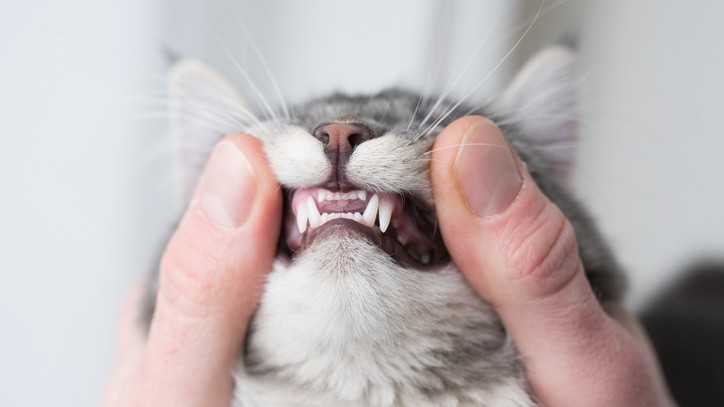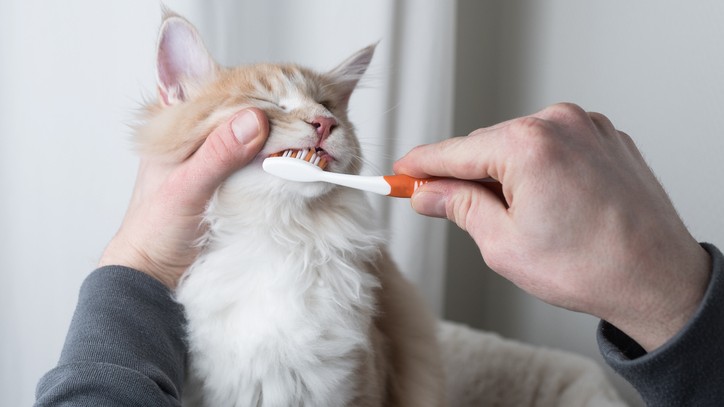Keep cat teeth clean: Five ways to help them stay healthy
Learn how to keep cat teeth clean and dental disease at bay with these tips from our vet

When it comes to keeping cat teeth clean, does your cat have fish breath? Are her gums red and irritated? She may be suffering from dental disease, a painful and progressive condition that is unfortunately all too common in our feline friends. Dental disease can occur in cats of any age, and can have a negative impact on their overall health and quality of life.
In fact, studies have found that between 50 and 90% of cats over the age of four have some form of dental disease. Once this starts, only professional dental treatment from your veterinarian can stop its progression. But the good news is that dental disease in cats is entirely preventable, and there are many steps you can take at home to keep your cat’s mouth healthy! Follow our tips below to learn how to keep your cat’s mouth clean and healthy.
1. Don’t assume that eating well means the mouth is healthy
Pet owners often assume that a pet with no difficulty eating must have healthy teeth. However, cats are particularly stoic, and they are experts at hiding their pain. Cats will often pretend that everything is okay, and they will continue to eat normally even with severe and painful dental disease. This is one of the reasons why it is so important for your cat to visit your veterinarian for physical examinations at least once a year. Your veterinarian is well-acquainted with the early signs of dental disease, and can often spot a problem during a physical examination long before your cat displays any significant behavior changes at home. When you are monitoring your cat’s dental health at home, look for signs like bad breath, red or bleeding gums, and yellow tartar buildup along the gum line, which are much more reliable indicators of your cat’s dental health.
2. Use veterinarian-approved dental diets and treats for additional protection
There’s no substitute for daily brushing when it comes to preventing dental disease. But for added protection, using dental treats and cat foods can help prevent plaque from forming on your cat’s teeth. These products are a great way to ensure you’re doing everything you possibly can to keep your cat’s teeth clean and healthy. Ask your veterinarian for product recommendations, or look for products labeled with the Veterinary Oral Health Council (VOHC) seal, which certifies that the product has been tested and was proven to prevent plaque formation. Dental treats and foods won’t reverse existing dental disease, but they can slow its progression and help prevent new problems from starting.
3. Brush your cat’s teeth every day to prevent dental disease

While it may seem like a daunting task, brushing your cat’s teeth once a day is the best way to prevent plaque buildup and keep dental disease at bay. Starting this process when your cat is a kitten can help, but even adult cats can learn to love brushing with the proper training. When you first start brushing your cat’s teeth, work slowly and brush only a few teeth at a time. As your cat gets used to the process, you can gradually start to brush more and more teeth at each sitting. You can use whatever type of toothbrush is most comfortable for both you and your cat – consider trying a finger brush or even dental wipes if a full-sized toothbrush is too unwieldy. Just remember to always use a toothpaste that is specifically formulated for pets, because human toothpastes can be harmful if swallowed. If you can’t brush your cat’s teeth every day, aim to complete a full mouth brushing at least a couple of times per week.
4. Avoid “anesthesia-free” dental cleanings – they aren’t safe for your cat!
You may have seen groomers or other laypeople advertising “anesthesia-free” dental cleanings for pets. These services are often touted as an easy and inexpensive way to treat dental disease, but unfortunately they can be very dangerous for your cat. Not only is it scary for your cat to have her teeth scraped and polished without anesthesia, but there’s also a significant risk for injury or aspiration of the disrupted dental bacteria. Anesthesia-free dental cleanings also do not address the bacteria that accumulate under your cat’s gum line, which is where the worst dental disease occurs. Without a professional dental cleaning, most dental problems will only continue to get worse, causing pain for your pet and additional expense for you.
5. See your veterinarian regularly for checkups and professional dental cleanings
When it comes to your cat’s dental health, there’s no substitute for a professional dental cleaning with your veterinarian. A veterinary dental cleaning involves a thorough examination of your cat’s mouth, including assessment of each individual tooth and a recording of these findings in the medical record. Your veterinarian will also take x-rays of your cat’s mouth, which will allow the vet to identify dental disease hiding beneath the surface of your cat’s mouth. After a complete evaluation of your cat’s dental health, your veterinarian will remove any diseased teeth and perform a careful clean and polish of each tooth. When the dental cleaning is complete, your cat will be sent home with pain medication and antibiotics if necessary, as well as detailed instructions for at home dental care. Although veterinary dental care can be expensive, the process is quite lengthy to ensure your cat’s whole mouth is clean and healthy.
Get the best advice, tips and top tech for your beloved Pets
Clean teeth are a must for your cat’s health
Dental disease doesn’t just cause bad breath – it can also contribute to heart disease, kidney problems, and a poor quality of life. Keeping your cat’s teeth clean and healthy is essential to promote overall health and longevity. With daily brushing, veterinarian-approved dental products, and regular veterinary care, you can ensure that your cat’s mouth stays fresh, clean, and pain-free!
Dr. Elizabeth Racine is a small animal general practice vet covering all things pet health and wellness. Her special interests include veterinary behavior, nutrition, and internal medicine.
As a freelance writer, Dr. Racine has written content for major companies in the industry such as the American Kennel Club, Merck Animal Health, Bayer PetBasics, Elanco, and CareCredit. In her free time, Dr. Racine enjoys playing trampoline dodgeball, hiking with her beagle Dasher, and spending time with her three mischievous cats.

